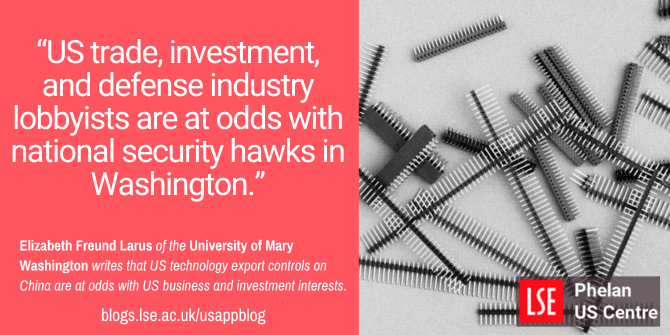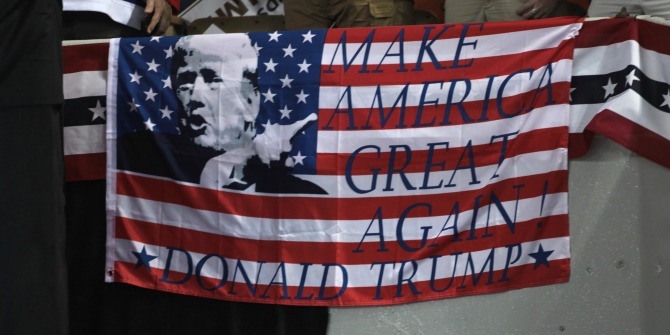 Last year the US government imposed semiconductor export controls on China amid concerns that the country was using civilian technology for military purposes. Elizabeth Larus writes that these and other measures such as the denial of license applications by the US Commerce Department and nuclear nonproliferation controls have put US trade, investment, and defense industry lobbyists at odds with national security hawks in Washington.
Last year the US government imposed semiconductor export controls on China amid concerns that the country was using civilian technology for military purposes. Elizabeth Larus writes that these and other measures such as the denial of license applications by the US Commerce Department and nuclear nonproliferation controls have put US trade, investment, and defense industry lobbyists at odds with national security hawks in Washington.
Concern that China is using US technology for military purposes led Washington to impose a series of export controls on US semiconductors and other sensitive technology in October 2022. Since 1989, US law has prohibited arms sales to China. Under Chinese leader Xi Jinping’s civilian-military fusion, however, China has been applying US-acquired technology to military uses. Aware of this practice, Washington has enacted several measures to limit export of sensitive technology that could feed China’s military modernization. These measures include both executive and legislative action.
The Export Control Reform Act of 2018 authorizes the US President to control dual-use exports such as software and technology for national security and foreign policy reasons on a non-emergency basis. The US licensing policy for China is to approve items for civil use to civil end users, but the US Commerce Department will deny license applications of national security items that would contribute to China’s military. This means that US firms that sell dual-use technologies to China might lose out to foreign competitors. The 2018 Foreign Investment Risk Review Modernization Act expands the powers of the Congressional Committee on Foreign Investment in the United States (CFIUS), allowing the committee greater scrutiny of potential Chinese investments in areas related to critical technologies, critical infrastructure, businesses with sensitive personal data, and some real estate transactions. As a result, CFIUS reviewed more investments from China in 2021 and 2022 than in previous years despite a drop in FDI from China into the US. In 2020, the US Commerce Department expanded restrictions on the export of goods, technology, and software to China, particularly those that involve potential military end uses or users, to include restrictions on materials processing, electronics, telecommunications, encryption and information security, semiconductors, sensors and lasers, and aircraft and propulsion items. They also added a licensing requirement for Chinese military end users.

Photo by Kier in Sight Archives on Unsplash
Strengthening US competitiveness
In August 2022, President Biden signed the $280 billion CHIPS and Science Act to strengthen US competitiveness with China by boosting semiconductor manufacturing. The act includes billions of dollars in subsidies for chip manufacturing on US soil and tax credits. In late 2022, the Commerce Department imposed new and expanded export controls on high-performance computing integrated circuits (ICs) to China. The move presumes denial for license applications to overcome these controls, but Commerce will evaluate license applications on a case-by-case basis. This means that any actors in the global semiconductor supply chain must carefully review the rules to determine what is required to comply and, if necessary, seek guidance or a license from the Commerce Department. Soon thereafter, US and western suppliers terminated relations some Chinese chipmakers. For instance, in July, Dutch chip-equipment provider ASML told its US employees to stop installing or servicing equipment in China, and equipment provider Applied Materials indicated that the export restrictions will kill its ability to make sales in China.
In August of this year, the Commerce Department imposed additional nuclear nonproliferation controls on China in response to expansion of its nuclear forces. The Nuclear Non-Proliferation Act of 1978 already required the Commerce Department to identify any materials or technology that could be used in a nuclear explosive device or in the development of such a device. Commerce’s August move expands the scope of nuclear-related export controls applicable to China, allowing the US to monitor the export of these items and to ensure they are only being used in peaceful activities.
Curbing China’s computing capabilities
Through these moves, Washington’s national security hawks seek to curb China’s advanced computing capabilities and slow its acquisition of sensitive technology. Despite imposing these controls, however, Biden and US business and environmental interest groups still want to engage China on trade and environmental issues. This summer, Biden dispatched Treasury Secretary Janet Yellen, climate czar John Kerry, and Commerce Secretary Gina Raimondo to Beijing to discuss these issues. While visiting China, Yellen stressed that the US did not want to decouple from China and that the two countries could cooperate on addressing global challenges such as climate change. At the same time, Yellen warned that the US was likely to impose additional export controls on sensitive technology and on American banks that invest in Chinese technology firms and startups. Yellen tried to mollify Beijing by indicating that export and investment controls are not about containing China’s economic growth but are to protect US national security. On the eve of Raimondo’s trip to China to strengthen bilateral commercial relations, her office dropped twenty-seven Chinese firms from a US blacklist, easing the companies’ ability to do business with the US. But in Beijing, Raimondo warned that US businesses are beginning to view China as “uninvestable” because of political risks.
How restrictions on China can hurt the US
While the controls restrict China’s access to advanced technology, the measures hurt US tech businesses, who are pressuring the White House and Congress to ease restrictions or at least take a lighter hand in imposing new controls. Expanded Commerce Department restrictions on the export to China of goods, technology, and software that involve potential military end uses or users have imposed a greater burden on US companies to conduct due diligence, putting the onus of proving innocence on the US firm.
US trade, investment, and defense industry lobbyists are at odds with national security hawks in Washington. To balance interests between actors who want to restrict Chinese access to US technology and those who seek to engage China, the Biden administration is denying China key technology while dispatching Cabinet-level officials to Beijing to talk about cooperation in business and the environment. Visits by Biden administration officials to China this summer amid fresh export controls indicate that Biden is trying to balance the interests of actors who want to maintain the engagement policy of recent decades with those who want to further restrict China’s ability to acquire US technology. This sends a confusing message to Beijing. As a result, there will be little progress in any talks between Washington and Beijing in such a confused atmosphere.
- Please read our comments policy before commenting.
- Note: This article gives the views of the author, and not the position of USAPP – American Politics and Policy, nor the London School of Economics.
- Shortened URL for this post: https://bit.ly/46dE9Lp






